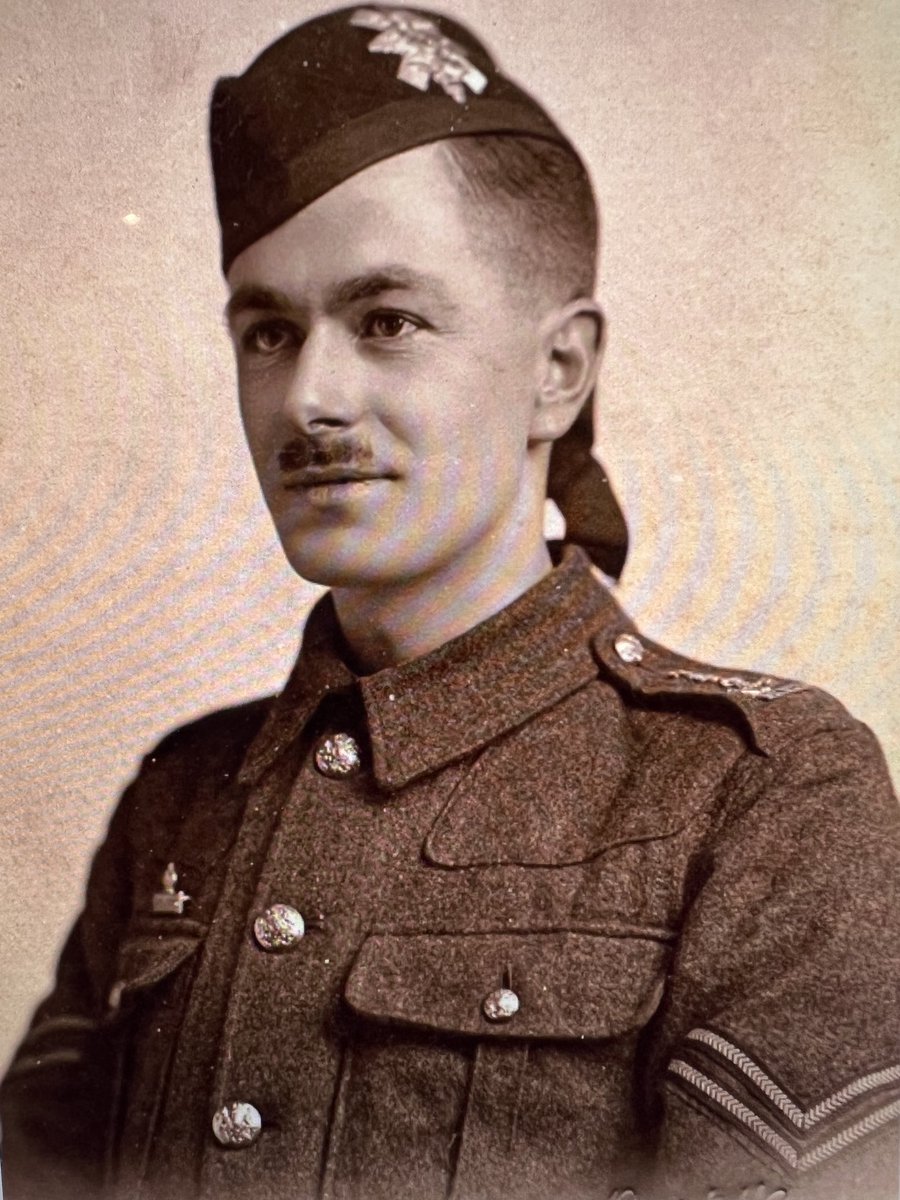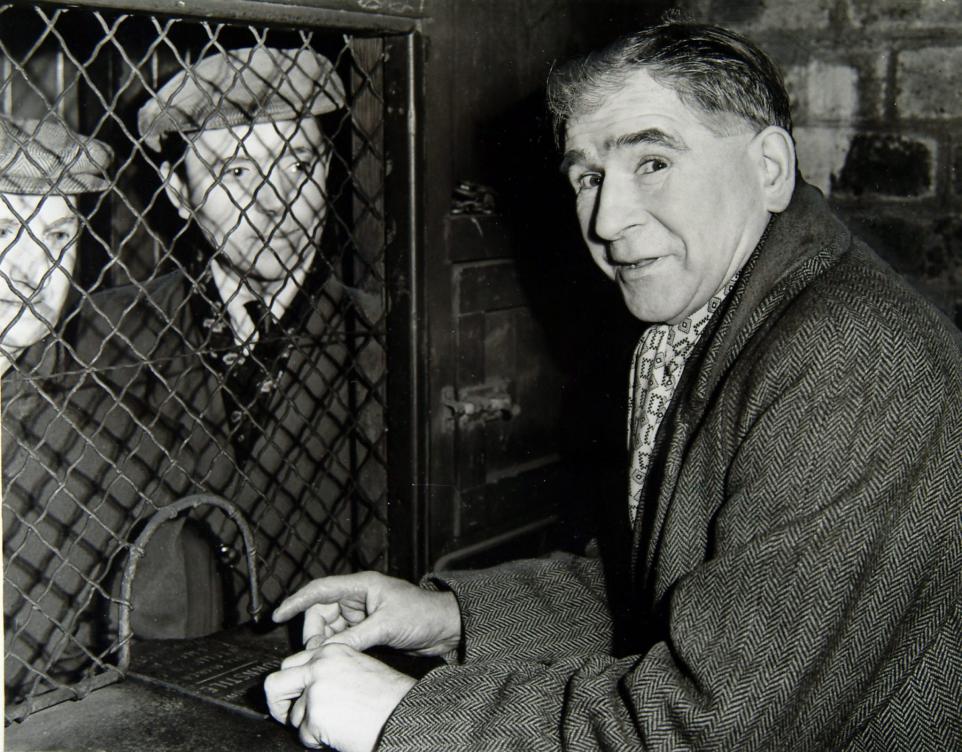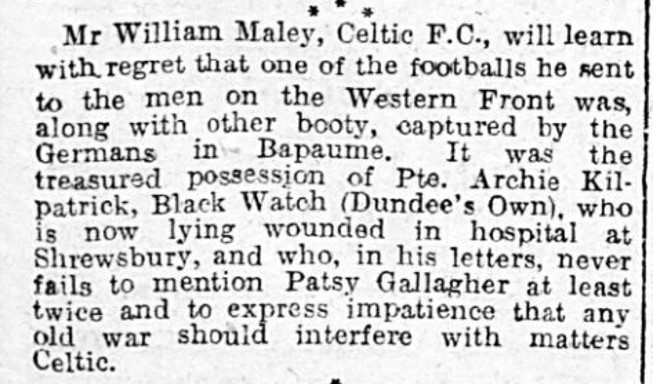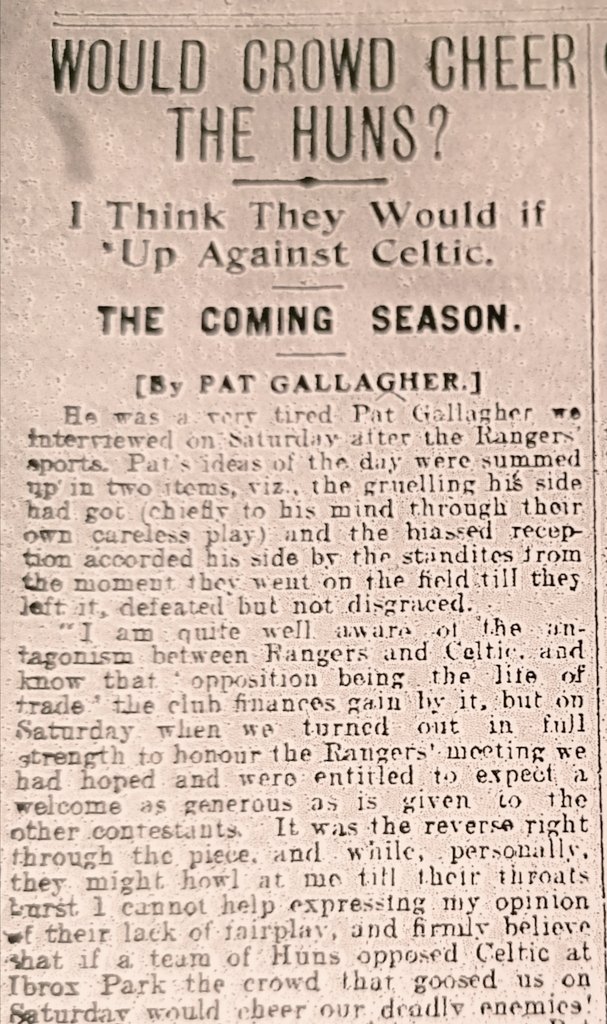The War Years | Celtic Games | Tournaments | Honours
Details
aka: World War One, WW1, The Great War
Ref: This section is for all the events which affected Celtic (players, staff and fans) during World War One.
Call–up: A list of all those players who made the call-up are as below
Celtic during ‘The Great War’
| “Glasgow fell silent” On death of Celtic player Peter Johnstone on the battlefield (RIP) |
The events of the First World War which began on July 28th 1914 were the most traumatic years in the history of the British Isles, much more so even than the Second World War despite what Hollywood may try to make out otherwise. This article is too short to cover every aspect, and out of respect will leave various social and political points for other more appropriate forums than this.
Ironically, just prior to the war, Celtic had toured in Germany in the summer of 1914 and played some of the local sides in friendly matches. However on moving onto Hungary, they were gazumped and tricked into a match which could be labelled as an unofficial ‘Battle of Britain‘ against English Cup winners Burnley. So Celtic were playing a ‘Battle of Britain‘ football match in a country in which soon the UK would be taking up arms against. The final score was 1-1 and Burnley were given the trophy (actually not handed over) on a coin toss. The match was replayed in Sep 1914 with Celtic winning the game at Burnley’s ground.
Just a month later, the assassination of Archduke Ferdinand led to events that began the war. Any friendships made in those tours were sadly to be put on hold by the war, a sorry state of affairs.
At the start of the war, bizarre as it may seem now, expectations were that the whole escapade would be a short one and be all over within a year. This delusion led to curious decisions by the authorities, one of which was to allow the bulk of footballers to remain playing with their clubs rather than sign up. The belief was that it helped to keep up morale on the home front. To allow the players to remain though Celtic had to obtain jobs for the players, and they had to combine hard labour in the factories along with their football careers.
Most of the squad was retained, a popular move as Celtic had a successful squad, but many other clubs also retained their players. An exception is Hearts, where (in)famously the bulk of their first team signed up for the war effort, with the hyperbole being that if they’d stayed together they’d have won the league. Admirable and jingoistic as this may sound, it was never repeated. Getting men to sign up en mass like this was a devious way to coerce men to go to war.
Some claim that Celtic should surrender the 1914/15 league title to Hearts on the basis that Celtic pipped Hearts to the title that season and that many of the Hearts first team were part of George McCrae’s Battalion (also known as the 16th Battalion, the Royal Scots). However, many of the Hearts players never actually left Edinburgh but were involved in “military training” and available to play on a Saturday – not very different, perhaps, from the lot of the Celtic players employed in “war related” work for twelve hours a day from Monday to Friday.
Many Celtic squad players (past and present) and staff opted for the armed forces, but sadly a number died in their efforts, or returned home with serious injuries. A list of the names related to Celtic is noted on this page below. Some are well known and celebrated, others sadly were to be just another statistic for the warmongers behind their mahogany desks in the war offices. For the rest of us, each of those men who served (and their families) deserve a pause for reflection on.
Amongst many others, Willie Angus, John McLaughlin, Archie McMillan, Leigh Roose, Donnie McLeod, Robert Craig and Peter Johnstone had all played on the field of Celtic Park and then fought in the Great War for their lives in the fields of France and Belgium.
The advent of the war in 1914 made a considerable difference to the life of a professional footballer. As well as the scrapping of the Scottish Cup, international matches were also stopped. Players’ wages were reduced by 25% and later fixed at £1 per week. No wages were paid during the close season and footballers were expected to take their place alongside the other workers in the munitions factories and shipyards. League matches were confined to Saturdays and holidays only; and players could only take part if they had worked the rest of the week. The conditions were strict.
As the war progressed the implications for the game were increasingly significant. Player salaries were reduced, employment in munitions factories on Saturdays resulted in a sharp fall in attendance, both by spectators and players and the pressure to complete the fixture card was significant. Celtic was forced to play two matches, against Raith Rovers and Motherwell, on the same day in 1916 in order to comply.
However, this didn’t stop the authorities unashamedly using football as a tool to enlist soldiers. Match days were commonly used as an ideal tool for recruitment drives for the war effort, and during one such event Celtic manager Willie Maley endorsed a mock trench warfare at Celtic Park designed to lure players and spectators alike to the Front. At half-time in some matches throughout Scotland, the slogan ‘Kitchener wants you‘ was carried round on placards with rousing appeals to fans to join in with the ‘fun‘ on the front. Football was simply used as a tool for enlistment and propaganda.
Once a game had finished, Willie Maley made sure the results were telegraphed to the war office, who then sent it onto the trenches so the soldiers knew the score about half an hour after the full-time whistle. It was said that Patsy Gallacher was the most talked about man in the trenches amongst Scottish soldiers – more so than even King George or the Kaiser.
During this war, 557,000 Scottish men joined up to fight but just over a quarter did not return home.
On the field, the league continued but the Scottish Cup & Scotland international matches were halted for the duration of the war, although charity matches and local cup tournaments remained.
For Celtic on a footballing front, it was a successful period albeit understandably overshadowed by more important happenings. The club were league champions going into the war, and having retained a number of Celtic’s best players, the good run continued. However, there was no policy of “safe jobs” found for players to avoid them having to sign up for the war effort. The club won the league title each year for the duration of the war, until the last in 1917-18 (where Celtic finished second).
Additionally, the club played a number of charity matches and allowed players released by the forces to play in invitation matches which helped raise funds for those in need. A notable set of charity matches, was in 1918 when Celtic won the ‘Navy and Army War Fund Shield‘, a friendly tournament that Celtic and a few other teams agreed to take part as a fundraising event to give money to footballers and their families who fought in the war.
The club also sent items like footballs to help bolster morale on the front. Would be interesting to know if any of these footballs were ever the ones used in the celebrated kick-abouts at Xmas between the warring sides.
The Celtic side was also said to have played some great football during these. With the quality at hand in the side, then that is not surprising. Great talent like Shaw, McNair, McLean, McMenemy and Gallacher is a treasure trove of players that any side in any era would crave for, let alone during wartime.
It should be noted that for many of the Celtic players, times were additionally hard at home. In August 1915, Alec McNair’s wife died and he had to bring up five children by himself while carrying out wartime work on a 12 hour shift, and still play for Celtic. We can only imagine the hardship this brought in those difficult years.
Andy McAtee was a miner. Patsy Gallacher worked in the shipyards. He was actually fined for bad time-keeping by the shipyards and because of that he wasn’t allowed to play for Celtic on a Saturday afternoon for eight matches.
As the war prolonged, it was to have a major financial and logistical impact on the clubs. Employment in munitions factories on Saturdays resulted in a sharp fall in attendance, both by spectators and players and the pressure to complete the fixture card was significant. However, clubs persevered. If anything, aiming to try to keep life as ‘normal‘ as possible can be important in times of trauma, especially for those on the front who wish to hear about good reports from home.
The major issue of Ireland arose during the war, the repercussions of which were to affect all at Celtic both on the field and off (and still do). The fight for independence had stepped up and so did the violence. Details are left for somewhere more appropriate, but their battle for independence had a huge impact on the north and exacerbated the political environment for the Irish in Scotland. It was no easy place to be Irish & Catholic. Many at Celtic were intrinsically tied up in the whole matter.
The war ended in 1918, but changes in society meant that Scotland in the post-war period remained a perilous place. It allowed Rangers to enforce their bigoted signing policies acting on the heightened tension in society, and fermenting the fears in communities.
Incredibly, according to one statistic Celtic had 53 players past-and-present to have fought in this war. Arsenal & Manchester Utd had 22 and 14 players respectively. That’s quite a number at Celtic compared to those lauded sides, and possibly this is little matched elsewhere. It doesn’t make Celtic any greater or otherwise than others, nor should it be taken as such, but it’s more just a surprising fact.
Celtic had come out of the war in as fair a shape as the club could have, but society was to radically change and nothing was to ever be the same again.
Matches
Articles
- Miscellaneous Articles
- Celtic Football Club and the Great War
- Spare a thought for the Bhoys of WW1
- Scotland v England – Ladies Football Match (Mar 1918)
- Navy and Army War Fund Shield
- Celtic & the Poppy Appeal
Books
- Celtic War Heroes: The Bhoys Who Went to War by Paul Lunney (2013)
- The Celtic, Glasgow Irish and the Great War: The Gathering Storms by Ian McCallum (2013)
- The Celtic, Glasgow Irish and the Great War: The Storms Break (2014)
- The Celtic, Glasgow Irish and the Great War: The End of Innocence (2016)
- The Celtic, Glasgow Irish and the Great War: The Blood Sacrifice (2019)
- The Celtic, Glasgow Irish and the Great War: An Ocean of Blood (2022)
Celtic Staff who made the call-up
Celtic lost players and staff to the war effort (both voluntary and due to the call-up).
Below is a list of players & staff from Celtic to have served/enlisted (both those playing to have signed up or have previously played for the first team). Players with an asterisk besides their name below are those who sadly died in service:
Players
- Willie Angus
- First ever Scottish Territorial soldier to win the Victoria Cross.
- Tom Barber
- Alex Bennett
- James Blessington
- Robert Boyle
- John Brown
- Joe Cassidy
- Joe Clark
- Thomas Clifford* (reserve team player)
- John Coleman
- Bernard Connolly
- Robert Craig*
- Willie Cringan
- Andrew Davidson
- Joe Dodds
- Scott Duncan
- William Ferguson
- Michael Gilhooley (reserve player)
- James Fisher
- John Hastie
- James Hay
- John Jackson
- Peter Johnstone*
- Frank Kelly*
- Willie Kivlichan
- George Livingstone
- Allan Lynch
- Andy McAtee
- Thomas McAteer
- Patrick McCabe
- Daniel McCann
- Tom McDermott
- William McGinnigle
- Tom McGregor
- James McIntosh
- Johnny McKay
- James McLaren
- John McLaughlin* (reserve team player)
- Donnie McLeod*
- John McMaster
- William McOustra
- James McStay
- James Murphy
- William Nichol
- Joe O’Kane
- Ebeneezer Owers
- David Pratt
- William Ribchester
- Leigh Richmond Roose*
- William Semple
- John Shaughnessy
- Thomas Sinclair
- Patrick Slavin*
- William Strang*
- David Taylor
- George Whitehead
- James Young
- John Young*
Notable Supporters
- Robert Downie*
- Awarded the Victoria Cross for bravery
Patriotic displays at Celtic Park during the WWI. 1 & 2-Willie Maley with Victoria Cross hero & Celtic player William Angus 3-Parade of British & French navy and British & Belgian army. 4-Bomb throwers from Royal Scots Fusiliers & Sgt Joe Gamble the Irish long distance champion









